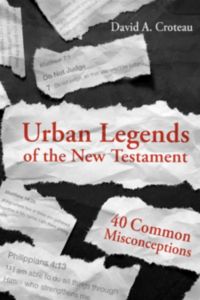⏱️ Estimated Reading Time: 2 min read
 One of the greatest areas of opportunity for pastors and ministry leaders exists in the sphere of helping them to read the Bible rightly and well. The problem of biblical illiteracy is a real issue in our day but so also is the neglected topic (at a lay level) of biblical interpretation. Many people struggle greatly with a variety of biblical topics. Some people misuse the Bible through ignorance while others do so knowing how to interpret the Bible but would rather give their thoughts than wrestle with the meaning of the biblical text. Avoiding misinterpretation and helping Christians to read the Bible well is central to the work of ministry. This is why as I read Urban legends of the New Testament 40 Misconceptions I was encouraged to see many of these issues dealt with and handled so well.
One of the greatest areas of opportunity for pastors and ministry leaders exists in the sphere of helping them to read the Bible rightly and well. The problem of biblical illiteracy is a real issue in our day but so also is the neglected topic (at a lay level) of biblical interpretation. Many people struggle greatly with a variety of biblical topics. Some people misuse the Bible through ignorance while others do so knowing how to interpret the Bible but would rather give their thoughts than wrestle with the meaning of the biblical text. Avoiding misinterpretation and helping Christians to read the Bible well is central to the work of ministry. This is why as I read Urban legends of the New Testament 40 Misconceptions I was encouraged to see many of these issues dealt with and handled so well.
This book has two parts: Urban legends in the Gospels, and Urban legends in The Acts of the Apostles, the Epistles, and Revelation. Part one considers issues such as Jesus was a carpenter, Jesus died when he was 33, do not judge others, John 3:16, Jesus sweats drops of blood, and many others. In part two, the author considers repentance, Paul as a tentmaker, good works, money is evil, tithing, pastor’s children, cults, and hell. Each chapter follows a helpful format where the author introduces the passage and topic under consideration, unravels the legend, sets the passage in it’s historical setting, and then tackles how readers should understand the passage.
Reading this book was a true joy. Whether you are brand new to the field of biblical interpretation or a seasoned veteran, Urban Legends has something for you. This thoughtful and helpful book will help Christians to learn how to handle the Word of God faithfully. I highly recommend this book and believe it will help Christians to learn how to interpret the Bible in responsible and helpful ways.
I received this book for free from B&H Academic for this review. I was not required to write a positive review. The opinions I have expressed are my own. I am disclosing this in accordance with the Federal Trade Commission’s 16 CFR, Part 255: “Guides Concerning the Use of Endorsements and Testimonials in Advertising.”



